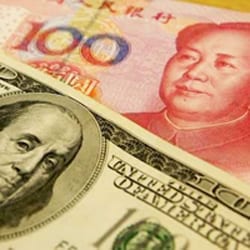Currency intervention has always drawn attention, yet few currencies have generated as much controversy in the United States as the Chinese yuan. China, the second largest economy in the world, is playing an increasingly large role in the global economy. When the value of the yuan dropped unexpectedly in August, concerns resurfaced about whether China has been manipulating the currency to benefit itself at the expense of the United States. Since currency depreciation is not uncommon, why do fluctuations in the yuan receive so much attention?
The reason may partly be that China is one of the largest exporters in the world, so changes in the Chinese exchange rate could cause major shock waves. Chinese trading rivals such as South Korea could let their own currencies fall in response to cheaper Chinese exports. China is also the largest source of U.S. imports (approximately 20 percent), so it is not hard to see why so many Americans are concerned by changes in the yuan.
As discussed at a Baker Institute event, Currency Policy Then and Now: 30th Anniversary of the Plaza Accord, coordination among different economies plays an important role in successfully altering exchange rates. Thirty years ago, the dollar was greatly overvalued, a fact acknowledged by other members of the G5, and the leaders of these five largest world economies agreed to actively depreciate the dollar rapidly and successfully. Without such agreement, the United States might have had a very difficult time using monetary and fiscal policy alone to manage depreciation.
With that in mind, a lack of agreement among major trading partners could make the currency devaluation of one country appear unfriendly. Especially when the Chinese economy was experiencing an economic slowdown, the decline in the value of the Chinese yuan in August was often interpreted as competitive devaluation to boost exports. Some U.S. politicians have even accused the Chinese government of continuous cheating to maintain a trade surplus. Whether or not this is true, there are strong opinions that China has been acting alone to further its own interests.
The general uncertainty about the actual value of the yuan might have contributed to these concerns about a currency war. Many claim that the Chinese currency is greatly undervalued while others claim it is actually overvalued. The People’s Bank of China has stated that the devaluation was part of its reforms to move toward a more market-oriented economy. China was aiming for its currency to be included in the International Monetary Fund’s special drawing rights (SDR), so it is possible that Chinese currency was overvalued at the time and that the market pricing mechanism correctly moved it lower.
China’s entry into SDR may trigger the need for more coordination among the major currencies because the new player will need to fit in, and shifting power is inevitable. With more responsibility and international attention, China might increase transparency and stay committed to financial reforms, and it might not engage in farther unexpected devaluation of the yuan. On the other hand, China might continue to act independently and strain relations with the other major economies.
Therefore, although the yuan has recently gained IMF reserve status, it is unclear how this will impact the global economy. One thing for sure is that the spotlight will now be on the yuan even more directly than before.
Mengjia Liu is a Rice University junior majoring in economics.
